blueorigin
Latest

Amazon plans to launch thousands of internet satellites
Amazon wants to launch thousands of low Earth orbit satellites to offer internet connection across the planet. With Project Kuiper, it aims to deploy 3,236 satellites to cover areas where about 95 percent of the global population live. Details otherwise are scant so far, including the estimated timeline for bringing the network online or how much the project will cost. Amazon confirmed the plans after GeekWire unearthed filings for it.
Kris Holt04.04.2019
Telesat inks satellite internet deals with Loon and Blue Origin
Canadian telecom Telesat has inked a couple of deals that could boost its aim to become a key player in the satellite internet field. It's planning to establish a low-earth orbit network of 292 satellites, with Jeff Bezos' Blue Origin helping to deploy them. Telesat will also use Alphabet-owned Loon's networking system to make sure the satellites work in harmony.
Kris Holt01.31.2019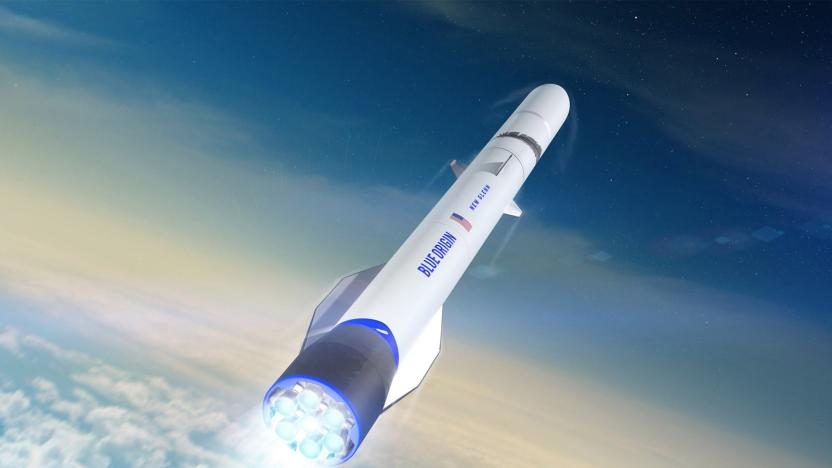
Blue Origin starts building the factory for New Glenn's engines
Blue Origin's New Glenn rocket just became more tangible. The company has officially started construction on a factory in Huntsville, Alabama that will produce the BE-4 engines powering both New Glenn and United Launch Alliance's Vulcan Centaur. It'll also make the BE-3U engines used for New Glenn's second stage. While it's not clear when the factory will start making rockets, Blue Origin expects to complete development later in 2019.
Jon Fingas01.27.2019
Blue Origin's latest New Shepard test flight hauled NASA experiments
Private aerospace company Blue Origin successfully carried out an uncrewed test flight today, marking the tenth time the Jeff Bezos-backed company has managed to send its reusable New Shepard rocket to space and recover it. This test was particularly noteworthy as the capsule carried eight research and development experiments from NASA.
AJ Dellinger01.23.2019
Blue Origin's New Glenn rocket wins Air Force contract
The US Air Force has just awarded three aerospace corporations contracts worth $2.2 billion in an effort to ensure that it can rely on domestic partners for launch vehicles. One of those companies is the Jeff Bezos-owned private space company Blue Origin, which will receive $500 million for the development of its New Glenn heavy lift orbital rocket. New Glenn was designed to have a reusable first stage and have the power to fly a 50-ton payload to Low Earth Orbit or a 14-ton load to geosynchronous orbit.
Mariella Moon10.11.2018
Jeff Bezos' Blue Origin beats key rival to rocket engine deal
Blue Origin is best known for its own rocket programs, but it just scored a deal that could make it an important name in the spaceflight industry. United Launch Alliance has chosen Blue Origin's BE-4 engine (two of them, to be exact) to power the booster stage its next-generation Vulcan Centaur rocket, which is due to launch in mid-2020. Jeff Bezos' outfit won't be the only rocket vendor involved, but it crucially beat out Aerojet Rocketdyne -- a behemoth in the industry that had tried to pressure ULA into avoiding Blue Origin tech altogether.
Jon Fingas09.30.2018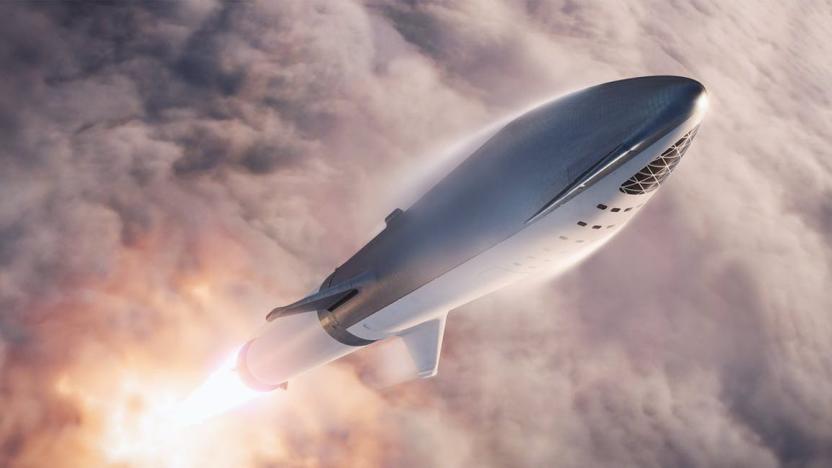
How the first space tourists will make it back to Earth alive
When SpaceX launches Japanese billionaire Yusaku Maezawa and his eight traveling companions for a trip around the Moon in 2023, the company will be undertaking an unprecedented step toward the future of civilian space flight. But with being the first to attempt this feat comes a number of technical and safety challenges that less ambitious expeditions, like Blue Origin's treks to the Karman Line, won't have to face. So, just how will SpaceX ensure that its first trip to the Moon doesn't turn into a real-life Gravity?
Andrew Tarantola09.25.2018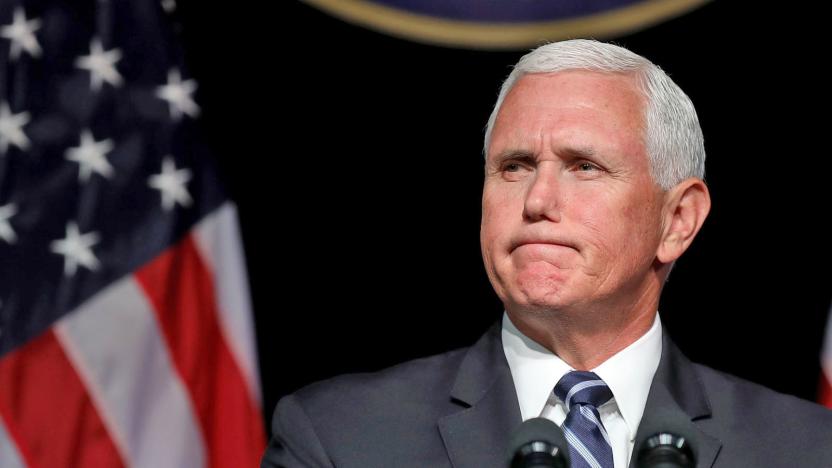
After Math: Space Farce
It takes a special breed of bureaucrat to look upon the majesty of the cosmos and think to themself, "man, I can't wait to get up there and start a war," but these are the times in which we live. So while the Trump administration spent this week eyeing the stars for something to shoot, NASA and the private space industry continued in their missions to explore the solar system without blowing everything up along the way.
Andrew Tarantola08.12.2018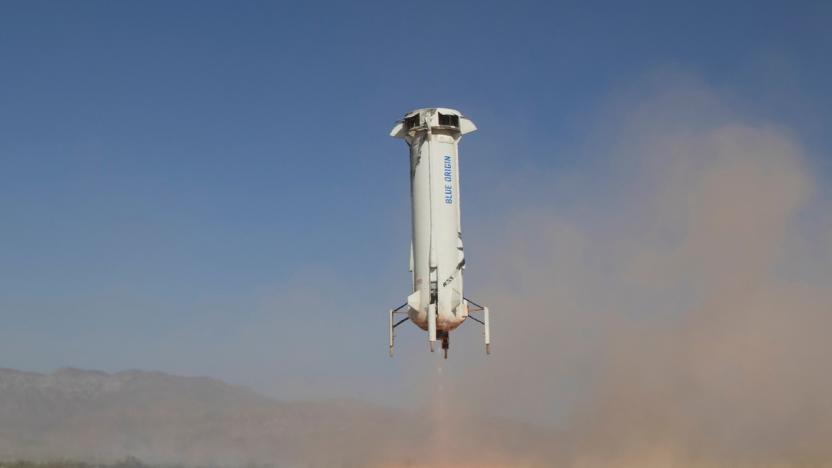
NASA picks for 'tipping point' space tech include Blue Origin and ULA
NASA's current administrator is rather fond of private spaceflight, and that's reflected in the agency's latest round of technology funding. The organization has forged ten partnerships that will develop "tipping point" tech promising to help both NASA's own missions as well as the "commercial space economy," including interplanetary exploration and satellites. Some of the names on the list are very familiar, and you'll find a couple of clear favorites.
Jon Fingas08.08.2018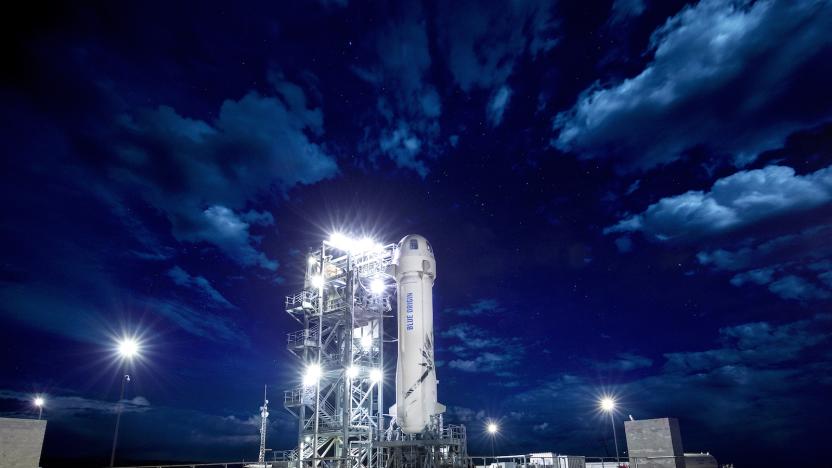
Blue Origin will perform a high-altitude abort test at 11AM ET (updated)
Today, Blue Origin, the space company founded by Amazon's Jeff Bezos, will perform another test on the sub-orbital New Shepard spacecraft and launch vehicle. This time, the company is looking at pushing the engines to their maximum limits with a high-altitude escape motor test. This will be the ninth test for the system. You can watch the live stream over at Blue Origin's website. The test is scheduled for 11AM ET / 10AM CT, and the webcast will begin around 20 minutes beforehand.
Swapna Krishna07.18.2018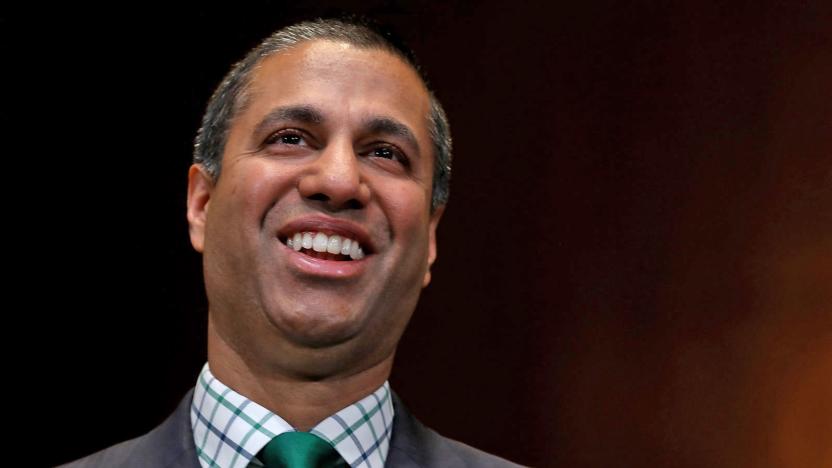
After Math: Stage 4 capitalism
It's been another fun-filled week of plebes like us being crushed under the heel of big business. Want to take a trip into orbit? You're gonna need to mortgage your house and your children's futures. Want to own the last decent MacBook Pro? Tough, Apple now says that the garbage touch panel version is the only one for sale. Trying to watch the World Cup on YouTubeTV? NOPE. NO SOCCER FOR YOU. COME BACK FOUR YEARS!
Andrew Tarantola07.15.2018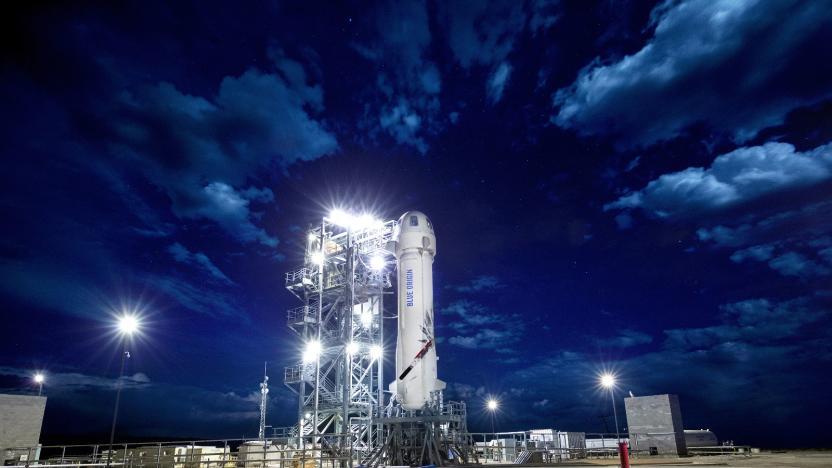
Blue Origin's suborbital flights might cost $200,000 per ticket
Blue Origin still has to launch its first manned flight before it can start taking people to suborbital space. But if you're wondering how much money to save for a trip, the answer could be at least 200 grand. According to Reuters, employees "with first-hand knowledge of the pricing plan" have divulged that a seat on the company's New Shepard system will cost between $200,000 to $300,000. If true, then its pricing will be comparable to Virgin Galactic's, which had already sold trips to suborbital space for $200,000 to $250,000 per person. As for when tickets will become available for purchase, executives revealed at a conference last month that they're planning to sell seats as soon as next year.
Mariella Moon07.13.2018
A beginner's guide to space tourism
The era of space tourism is nearly upon us with Blue Origin, SpaceX and Virgin Galactic each vying to be the first company to ferry clients on once-in-a-lifetime treks up to the edge of space and back. While SpaceX is the clear frontrunner when it comes to cargo and satellite launches, Blue Origin is leading the pack in terms of putting actual people into actual orbit.
Andrew Tarantola07.04.2018
The app promising to make anyone an astronaut
Every kid dreams of becoming an astronaut, of exploring what lies beyond our planet out there in the unknown. It's a romantic notion, but something few ever achieve. The growth of the private space industry in recent times has made it seem all the more attainable, however. Under current projections, SpaceX, Blue Origin and Virgin Galactic will start taking space tourists on trips next year, perhaps even earlier. Naturally, seats on these craft are reserved for the extremely wealthy right now, but there could be another way. Space Nation is a company that's promising anyone can become an astronaut, irrespective of how deep their pockets are. And all you need to do to become a viable candidate is to play a bunch of mobile minigames.
Jamie Rigg07.02.2018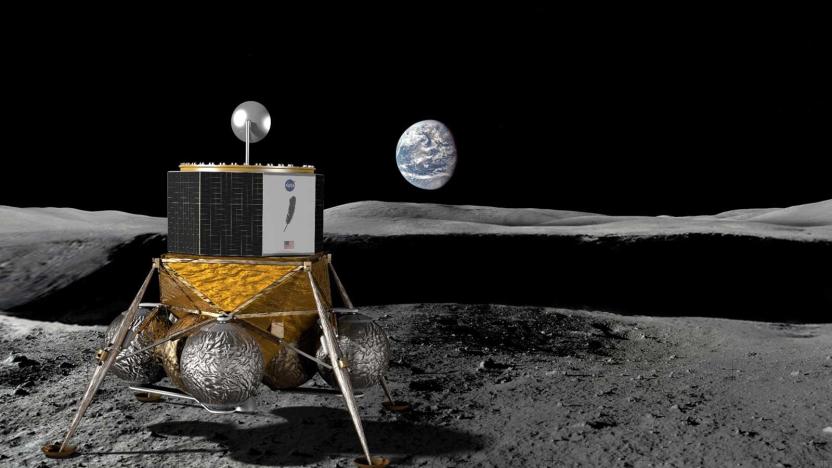
Jeff Bezos outlines Blue Origin's space colony ambitions
It's no secret that Jeff Bezos wants humanity to return to the Moon and otherwise spread its wings beyond Earth. Now, though, he's offering a clearer sense of what that entails -- and it's evident that his ideas stretch well into the long term. In an interview with GeekWire, he explained that he wants Blue Origin to work with NASA and the ESA to create a permanent settlement on the Moon, but will do whatever it takes to make it happen. Don't expect the company to wait if it thinks officials are wasting time, in other words. The company alreadt anticipates launching its Blue Moon lander (above) by the mid-2020s, but that's contingent on getting enough support.
Jon Fingas05.27.2018
Blue Origin completes its highest-ever test flight
Blue Origin's first test flight of 2018 was a success, and then some. After last-minute weather setbacks, Jeff Bezos' outfit completed its eighth New Shepard launch and landing, including a touchdown for the dummy-equipped Crew Capsule 2.0. More importantly, it represented a crucial milestone -- the mission reached an apogee of 351,000 feet, which is both the highest altitude yet and the target for Blue Origin's full-fledged service.
Jon Fingas04.29.2018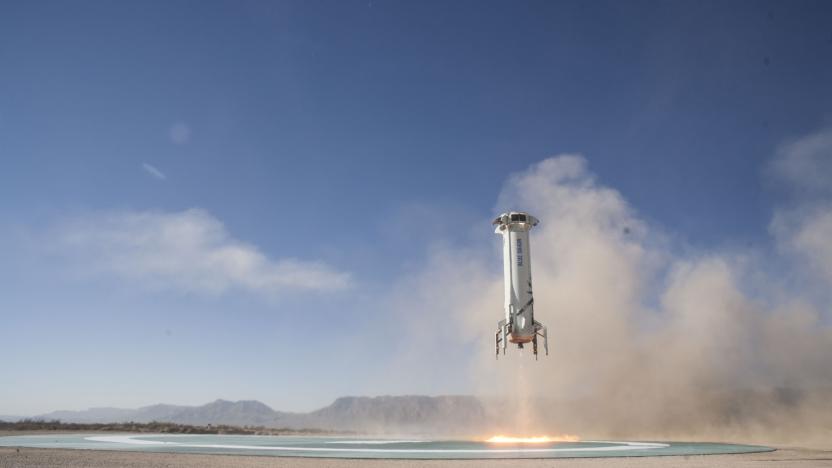
Blue Origin will livestream its first test flight of 2018
Blue Origin is gearing up for its eighth test flight, which also happens to be its first for 2018, on April 29th. Thankfully, it's one we'll be able to watch: Blue Origin chief Jeff Bezos has announced on Twitter that it's live streaming the event on Sunday. The company hasn't posted the stream's details yet, but you can expect it to go live around 8:30AM CDT (9:30AM Eastern) when the launch window opens.
Mariella Moon04.28.2018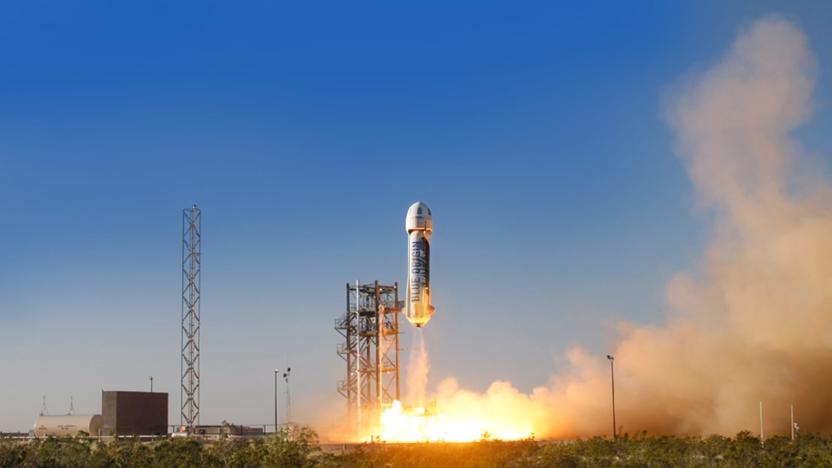
Blue Origin isn't interested in a race with SpaceX
When we talk about the current era of private spaceflight, the phrase "space race" is thrown around quite often. It's meant as a good thing; a space race against the Russians is what put American astronauts on the moon. The idea of rocket billionaires like Elon Musk and Jeff Bezos working day and night to outdo one another in some spectacle of bravado may sound appealing; it would certainly have entertainment value. But a space race isn't necessarily, in and of itself, a good thing. After all, it's why we've been stuck in low Earth orbit for going on five decades.
Swapna Krishna02.28.2018
The new space race is postponed until 2018
Aboard the International Space Station, an A4-size flag of the United States hangs next to a 1:100 model of a space shuttle. The memento, placed there by the last crew to fly on shuttle Atlantis, is meant to be retrieved by the next batch of astronauts that launches on a US spacecraft. NASA had hoped to reach that goal in 2017 after awarding Boeing and SpaceX billion-dollar contracts under the Commercial Crew Program (CCP). However, the road back to manned missions is paved with thorns and technical challenges. We certainly won't see any astronauts ferried to Low Earth Orbit before the year ends, but both companies believe that 2018 is the year that flag will be returned to Earth.
Mariella Moon12.26.2017
Blue Origin might launch a manned New Shepard flight in 2018
We might witness several new space vehicles blast off with a human crew onboard for the first time next year. One of them could be Blue Origin's New Shepard launch system. According to Jeff Ashby, the private space corporation's director of safety and mission assurance, Blue Origin is "about roughly a year out from human flights, depending on how the test program goes." Ashby spoke at the Next-Generation Suborbital Researchers Conference just a few days after his company successfully sent Crew Capsule 2.0 to suborbital space with "Mannequin Skywalker" on board.
Mariella Moon12.20.2017